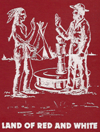 FAMILY MEMORIES OF ABE AND RACHEL GRANGER -
FAMILY MEMORIES OF ABE AND RACHEL GRANGER -
by Jean (Granger) Kinch
Our mother, nee Rachel Annie Hall, told us that when she was a girl she declared to one and all that one thing for sure, she would never marry a man called Abe. However, when she met Dad her resolution went down the drain and she married Abram Fredrick Granger on November 11th, 1908.
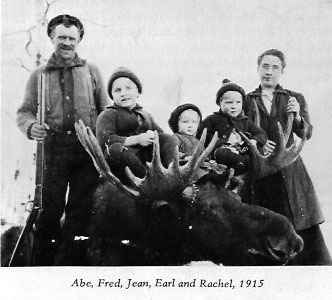
In 1909 after their home in Aurora, Ontario was destroyed by fire they decided to go out west. They stopped in Tilston, Manitoba where Dad worked for a few months to earn a little extra money. Mom's sister, Mary and Dad's brother Will remained there. With their little baby Fred they headed on to Alberta. They ran a restaurant in Kitscoty for a short time. In the spring of 1911 they heard homesteads were available north of North Saskatchewan - River.They came north and Dad filed on the S.W. of 18-563-W. 4th meridian. They lived in a shack at Laurier Lake until they could build their house on the homestead.
They put up with many hardships. Mom had never lived in the country. In Ontario she had worked for her Aunt Sarah and Uncle Will Fleming in their hotel. They later came to Marwayne and ran the hotel there for several years. Mom said she felt like she had been picked up and set down in the middle of nowhere. They had little or no farm equipment. Dad bought a team of oxen they named Bummer and Charlie, a wagon and plow.
In time they got some cattle, chickens and a pig or two, and Dad started to take out logs which he had sawed up for lumber and made a start at building on the homestead. They cleared some land and broke a field. Also they broke and cropped a field on the place at Laurier Lake where they were living temporarily.
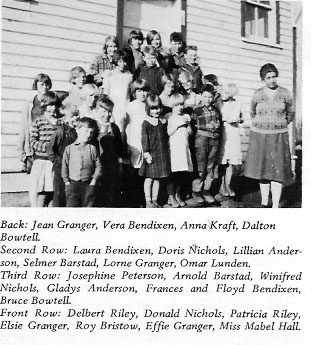

Supplies had to be brought from Vermilion or Kitscoty, a tortuous round trip of one hundred miles. Grain had to be hauled to Kitscoty elevators. There was no limit to the amount they could sell, but they never had very much to haul. They tried to keep enough wheat to take to Weibe's Flour Mill in Vermilion to have ground into enough flour for a year's supply. No small amount, for as their family grew Mom baked approximately nine loaves of bread twice a week. Each trip took several days especially when the winter blizzards hit and brought travel to a standstill. Mom had to learn to milk the cows and do other farm chores. She had heard some pretty lurid Indian tales that did little for her peace of mind and quite often they would call to trade fish or wild meat for butter, lard, tea or other foods that were also necessary to them. She soon learned they were friends and willingly helped when needed. One trip Dad and Grandad Granger, who had come west with them, were stranded on the south side of the river for over a week by an early freeze until the ice became thick enough to walk across, carrying as much flour and other supplies as they could manage. Mom said she got pretty tired of eating flour porridge and bannock made from shorts which was all they had left from their last grist.
Game and fish were plentiful and Dad loved hunting and fishing. He often went as a guide for hunters who came from quite some distance south of the river. He had some very enjoyable trips hunting with John Nichols and other neighbors. He was especially proud of one extra large moose that he shot. It took him nearly a week to get it home from across the lake, skinned and ready for usable meat.
Mom's garden at the Lake supplied fresh vegetables which she canned for winter use. They were very fond of pigweed greens (Lambsquarter). She canned them for winter. They grew and still grow wild although they are not used for food as much as in the early days. She also picked and canned wild fruit; saskatoons, raspberries, currants, strawberries, blueberries and cranberries which were plentiful and grew near by.
Dad struggled to make a living off the farm, but, perhaps because he grew up in the city and had to work instead of going to school and his youth was spent in the logging camps of Northern Ontario, he knew little about land and the homestead turned out to have a very thin layer of top soil and an almost endless gravel subsoil. In fact, a fair sized portion of it is now a County gravel pit. Unless rain was plentiful all through the growing season the crops didn't am,ount to much. However, potatoes and turnips grew well in the poor soil and there was good sale for them among the Indian neighbors and newcomers who were moving into the district. I recall asking Dad the name of a plant growing in the wheat field. "Oh," he answered, "That's just a wild oat." We who farm have learned that a wild oat soon became a field of wild oats. We can remember too, when the first magpie was seen in the district. We thought it was such a beautiful bird. Charlie Keil, a horse trader, who came into the district in the 1920's from the dried out south, said to Dad, "We had quite a campaign against those pests in the south, why don't they do something with them here?" To which Dad replied, "Yes, they're starving them out and they're moving up here."
A few years later my brother Lorne won a five dollar prize from the county for the most points in a campaign against pests. Two points for each gopher tail, two points for each pair of magpie and crow feet, one point for each magpie and crow egg. With the help of his two brothers, Fred and Earl, they made a hole in each end of the egg and blew out the contents, threaded them on strings and festooned the walls with them. A reliable person, school teacher acceptable, had to count them. The Frog Lake School teacher, elderly Miss Mabel Hall, came to count them. She fastidiously picked up each gopher tail and each pair of feet and put them in piles of twenty. The eggs were easier to count. In all there were 2,897 points.
As more people moved in, closer contact with neighbors became possible. House to house cribbage parties were organized and dances were held in the nearby school houses. A skating rink was cleared of snow on Ross Lake and a men's hockey team was formed. Dad was goalie. Elk Point and Mooswa hockey teams used to come and play on weekends. During one game against Elk Point, Dr. Miller shot the puck. It hit Dad on the nose. Doc skated up to where Dad was lying on the ice, looked at the nose and said, "It's broken, Abe," and before Dad knew what was happening, Doc caught the nose between his thumb and finger, gave it a twist and the broken bone was set. That night at the supper table Dad said to Mom, "Dang me, Rachel, it hurt. I coulda hit him." "Well, Abe," Mom answered, "It could have been a trip to Elk Point and five dollars for Doctor Miller if he hadn't set it that way."
Oxen were slow but dependable in cool weather but when it was hot the shade of trees beside the fields became an irresistable temptation and no amount of coaxing or prodding could make them work. In fly time whatever equipment they were pulling followed them into the nearest slough. As soon as possible Dad bought a team of horses.
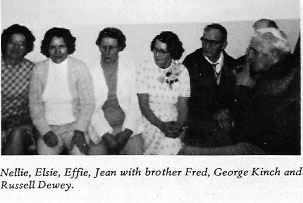
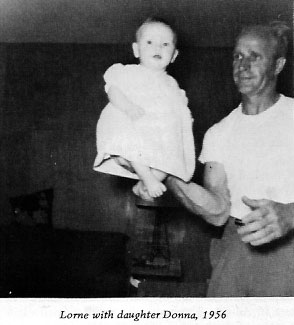
They used to raise a few geese and Mom sold hatching eggs at twenty-five cents each. They had one particularly mean gander that never learned who owned him and who were strangers. Whenever a storm cloud was noticed whoever happened to be around had to fill the huge kitchen wood box. It held enough to supply dry wood for three or four days. One afternoon Mom saw a storm cloud coming up and she set us youngsters to work filling the wood box. She took the axe and began to split kindling that was used along with a couple of pages of the Edmonton Bulletin to start fires when the cook stove went out. She just started chopping when along came the gander and caught the back of her skirt in his beak and began thumping her legs with his wings. When she reached down to catch him by the neck her skirt and gander would swing out of reach in the opposite direction. This went on until Mom and gander were both played out and soaked from the storm. He took off bragging to his harem as ganders do when they have performed a special feat. A few days later he took after Fred who had an old broom in his hand and landed the gander a clout on the head with it. The gander turned his toes up and Fred and brother Earl hid him under a granary hoping he wouldn't be missed and punishment delayed for a while. The gander proved to be a tough old bird and in four or five hours came staggering out from under the granary. This same old bird lived long enough to knock me down. I was about five or six years old and can remember it quite well. If you have never been bitten and pounded black and blue by a gander you haven't taken any real punishment. I spent several miserable days in bed during which time we had tough, stuffed, roasted goose. It seems that nothing could be wasted.
As we grew up money was scarce but we were happy. The family increased to seven. We were happy and healthy and enjoyed life on the farm. We went to the Frog Lake school. At first we had only a mile walk to school but before too long it was decided the school should be in a more central part of the district. One morning we woke up to learn we had to walk two and a half miles into the bush to school. I wouldn't be truthful if I said we didn't resent it. We walked or rode horseback when the weather was warm but when it was cold Dad or Grandad drove us on the front bob of the sleigh on which he had built a kind of cutter box. We snuggled under a cow robe, a cow hide tanned with the hair left on, by an Indian woman, and lined with material from heavy coats the folks had brought with them from "back east." They had a foot warmer and early in the morning Mom would put the special black brick on the coals near the front door of the old wood cook stove. When it became red hot Dad fished it off the coals into the open drawer of the foot warmer, closed the drawer and tucked the warmer at our feet under the cow robe. Sometimes when they ran out of bricks they heated a large rock or a green poplar stick of heater wood in the oven, wrapped it in a blanket to hold the heat and used it in place of the foot warmer. Later we drove one horse on a homemade toboggan contraption. That's when we froze our feet and fingers. The toboggan was narrow and tipped over easily and many times we arrived at school looking more like snow men than people.
Dad also liked logging and lumbering and spent several winters logging and working at saw mills. By this time he had several nice strawberry roan horses and used to haul four horse loads of lumber home from the mills and take it south to sell. He also hauled fish (salmon trout) from Cold Lake and peddled them south of the river. As the boys finished school they helped him in the lumber camps.
Mom earned pin money as local reporter for the Edmonton Bulletin and later for the Edmonton Journal after it took over the Bulletin. She made a lot of our clothes. She made me a very pretty new dress from a nice gingham flour sack material which I proudly put on and wore to school. Quaker Flour mills sold flour in printed flour sacks, some times a gingham check and sometimes a flowered material. Imagine my chagrin when the boy in the desk in front of me had on a nice new shirt made of the same nice gingham flour sack material.
Mom kept quite a comprehensive diary from January 1st, 1911 to March 31st, 1932. It tells of difficulties finding cows at milking time before much land was fenced. They nursed us through scarlet fever and flu, and paid back taxes by working on the roads, finally admitting the farm didn't pay. It shows how much the pioneers of this area depended on each other. It reveals how much they dreaded the bush and grass fires before fields and wide roads helped to fire guard. The viewpoint of present day ecologists would have held little interest for them. Their livelihood depended on taming the environment. Trees, brush, gophers, badgers, coyotes, hawks and owls, almost anything that couldn't be used for food was regarded as a pest and had to be contended with. One morning a big hawk came after a chicken. Mom ran out with a frying pan she was washing and knocked the hawk silly with it. Later Grandad shot it. Rabbits and prairie chickens, fattened on the stooks and stacks, were delicious. People were friendly and generous, willing to lend a neighbor anything from food to horses and machinery.
Threshing depended on Bristow's big steam threshing outfit and sometimes the stacks didn't get threshed until mid-January. Later Dad joined a syndicate and bought an old Racine thresher with a straw carrier instead of a more modern blower.
Neighbors were willing helpers in times of illness. They were also the undertakers and all helped with grave digging, supplying their own tools. Often the ladies of the district lined the homemade caskets. These customs are almost nonexistent now. There are items that reveal an interest in, and contact with, people from outside the circle of their own district.
After Mom's death in 1932, at the age of forty-two, Dad left the homestead and sold the old house to the All People's Gospel Mission for a manse. He moved to the N.W. 10-56-3-W of 4th Meridian which he had purchased from Alex Peterson before Mom's death. He and Fred continued farming until he applied for his old age pension. In his search for proof of age he learned that he was seventy-two instead of seventy. He immediately quit farming. In 1948 he made a trip to California to see a brother whom he hadn't seen since he left the East. He also had a visit from his brother Will whom he had parted from in Tilston, Manitoba in 1909. He passed away in 1951. All their seven children are still living in Alberta; Fred, Earl, Effie (Mrs. Russell Dewey), Elsie (Mrs. Lloyd McLean) all of White- court, Lorne of Sherwood Park, Nellie (Mrs. Floyd Nelson) and me, Jean (Mrs. George Kinch), both of Heinsburg.
Some excerpts from Mom's diary of community interest:
1911: Oct. - Abe and Grandad hunting. Shot two moose north west of Laurier Lake, on way home the boat got stuck in ice, they didn't get home until 1:30 next morning although they got the moose at 8 a.m.
1913: Mar. 26 - Mr. Philcox and Mr. Fred Gregor came in to build Gregor's shack on 14.
Nov. 23 - Three Mr. Bietschs called to see about a petition for a ferry at Heinsburg. We all went to Jones', Otto Martin was there and we all helped Mr. and Mrs. Jones write the petition.
1919: May 19 - Heavy smoke came over in the evening. May 21 - Sadie and I went to Heins' store. From the corner to Heins' burned almost clean on 19th. McCormick's stable, harness and almost everything he had went up in smoke. Gordons were burned out. The Harris family and Steve Burgess lost their barns and everything but their houses; Mr. Hartman also. Heard that Lac La Biche was wiped out completely and that people escaped with their lives only by jumping into the lake and using wet blankets. The wind veered to the north and brought the smoke over here so thick as to make it dark at 7: p.m.
1919: Oct. 8 - An awful day, snowing and so cold.
Oct. 9 - Cold but clear. It looks so strange outdoors with the snow on the ground and leaves still on the trees.
Oct. 12 - Snow still on ground. Skunk got under our granary and Abe shot it.
Oct. 15 - Mr. Lewis called. He was looking for a place to build a store. Abe sold him the skunk for 750.
Oct. 17 - Ma and I went to Jew's store, we got $1.00 worth of sugar each. That is all he would spare to one customer because of shortage. Cost 15¢ a pound. Sillem's grain not cut yet, nor is Jenner's and all that snow on it. Jenner is trying to cut his with the binder.
Oct. 25 - Mr. Lewis and his sister Miss Lewis, came and stayed all night, very nice people. The first time we ever had to entertain a millionaire in our house. They are out buying fur and still trying to locate a place to build a store. Oct. 29 - A very rough day. Snow, snow, snow all day but not so cold.
Dec. 17 - This is the day that Prof. Porta prophesied it was to be so cold - 215 at least. So many people did not know what was going to happen and were scared. A huge comet was supposed to hit the sun and either fall or tear a piece from the sun, but it was a beautiful day, lovely and warm. 1920: Feb. 5 - Abe helping McGowan. Some awful job pulling sheaves out of the snow, some stooks can't be seen. Feed shortage very bad; very few people have enough feed to put them through till spring. A lot of horses and cattle are dying because of cold and so little feed. There were 125 head of cattle went past here today to be fed at Dave Bristow's.
Feb. 16 - Abe went to Lewis' new store. He has not opened up yet and everyone is so busy; he is in Harry Bowtell's big granary on the hill, putting in an eleven thousand dollar stock.
May 3 - Nice day. Snow still covers the ground and river still impassable. This has been a very severe winter, snow on ground since Oct. 8th; no feed for stock to be had anywhere in Alberta. Thousands and thousands of cattle died for want of feed; hay as high as $70. a ton and sheaves 50¢ each but can't be bought now at any price.
1923: Sept. 20 - Raetz sale at Mooswa, everything went so cheap - horses brought from $5. to $20., cows from $10. to $25. and chickens 104 each.
Nov. 5 - Went to schoolhouse and voted on liquor plebiscite. The province went wet by about 30,000 majority. 1927: Jan. 12 - Fred Hall and Grandma went to Elk Point yesterday and they tell us that twenty miles of railway is contracted for from Elk Point east and Howard Cinnamon has the contract for ties between Ferguson Flats and Mooswa.
1929: Jul. 12 - Several people went to Vermilion where the 12th of July was celebrated, over 2000 people were present. K.K.K. burned fiery crosses on the hill north of Vermilion protesting the renaming of Wellsdale to Clandonald. Nov. 13 - Fire started up north and fanned by a north west wind it swept across the reserve at a fearful rate. Twenty- three head of horses were badly burned, over half of them had to be shot. Abe went to help fight fire from Alex Peterson's at 9: p.m. and didn't get home until 4 in the morning.


